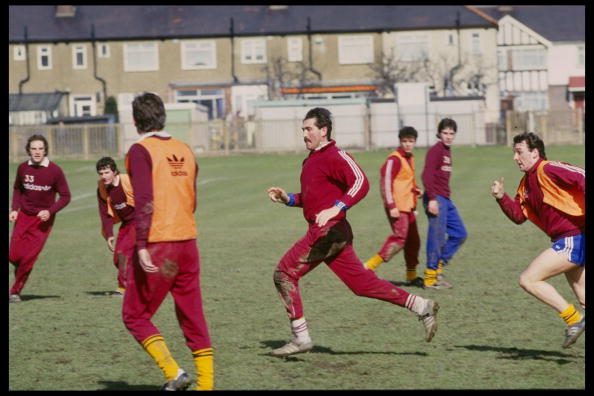WHILE most modern professional cricketers have year-round contracts to stave off February’s chill, many of their predecessors had to spend the northern winter in alternative employment to make ends meet.
People forget now how poorly paid most county cricketers were 30 years ago, a winter job a necessity if they were to stay warm and well fed enough to report back for cricket hale and hearty on April 1.
With six months to fill, and with many having few other qualifications other than an artful way with bat and ball, most, though not all, were saddled with jobs that were dull, menial and gloriously inappropriate.
If they are not in the gym, many of today’s county cricketers head abroad to winter in the sun playing club or district cricket in places like Australia, South Africa and New Zealand. That still occur-red back in the 1970s and 80s but on nothing like the current scale, which left scores of players seeking jobs in England once the season ended in mid-September.
Some lucked out and managed to enjoy their second job while others lasted only a few weeks. Keith Fletcher, Essex captain, used to sell oil and diesel to farmers during the winters he was not touring with England. A man close to the land, and with most Essex farmers keen on cricket, Fletch made a great success of it and retains many of the friendships made then to this day.
John Lever, at least before he became a regular member of England’s touring parties, had a variety of jobs in the close season. One that he and Ray East did was to drive new cars for a dealership in Chelmsford up to Scotland.
“It was mainly Hillman Avengers but I remember once we were given Rover 2000s to drive up to Glasgow,” said Lever. “We drove them up and brought the old company cars back to Chelmsford. We did that trip in a day – and that in the days before Red Bull!”
Lever also worked for Access, the credit card company whose HQ was in Southend. Indeed, Access employed six other Essex players mainly to do jobs like filing and sorting accounts.
“It was pretty dull work but it was leavened by the fact that they also employed 2,000 women between the ages of 18-25, which kept morale up,” said Lever. “Anyway, I worked in the Access social club through which every function and party had to be organised, so it was very convivial.”
Being a bowler, some wise guy on the Essex committee felt Lever ought to seek out manual labour during the off season in order to build himself up for bowling. “Working for Stuart Surridge, the bat manufacturer, and chopping down Willow trees was suggested,” said Lever. “But by the time I’d considered it they’d moved from axes to chain saws so I didn’t really see the point.” East, a maverick left-arm spinner, sampled a few jobs, though they didn’t always last the winter. One that didn’t was for a plastics factory in Ilford. His task was to feed a huge buzz saw which cut blocks of material into smaller pieces.
As he was being shown the ropes, the foreman asked him what he used to do. “I usually bowl left-arm spin for Essex,” he said. “Not if you lose your hand in there you won’t,” came the gruff reply. Within a month Easty, never the calmest man in a crisis, was seeking alternative employment.
Conscious of their playing staff’s dilemma, Essex occasionally offered winter jobs like painting the sight-screens and the stands at Chelmsford. They also offered coaching roles at the various indoor schools like Ilford.
Although he rarely coached, David Acfield, Essex’s off-spinner during the 1970s and 80s, did become a supply teacher, working at schools on Canvey Island. For those who think cricketers had it easy back then, that is about as tough as it gets.
There is a theory that it is good to do something out of your comfort zone but there are limits. Harry Pilling, Lancashire’s diminutive batsman and a dynamic fielder, occasionally spent his winter months as a grave digger, but then expectations were not as great then even for winners of the Gillette Cup.
Pilling’s team mate David Lloyd, now the doyen of Sky’s commentary team, worked for a brewery selling beer. Although not as exciting as having Jeff Thomson thunder one into your nether regions, it was a lot less painful. For other kicks post- Thommo, Lloyd also turned to selling double glazing, his ability to succeed at anything evident after Accrington was described as the snuggest town in Lancashire.
Some really did find contentment, as with Graham Gooch, fulfilling their schoolboy fantasies into the bargain. His batting talent evident from a young age, the Essex sages felt Gooch would be well served, in the days before he became an England regular, by spending his winters training with West Ham to improve his fitness.
A lifelong Hammers fan, Gooch was in clover, jumping for corners with Billy Bonds and trying to round Frank Lampard Snr. It worked too, his improved fitness helping him become England’s greatest run-scorer, a record only recently beaten by Alastair Cook.
A protege of Gooch’s, Cook bought into his mentor’s beliefs on fitness which began back on Chadwell Heath with West Ham in the early 1970s.
Proof, in any were needed, that not all those winter jobs were in vain.
This piece originally featured in The Cricket Paper, February 10 2017
Subscribe to the digital edition of The Cricket Paper here












